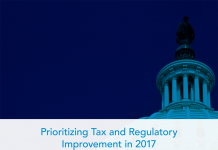
Executive Summary
By Dr. William Gentry, Ph.D., Professor of Economics
Williams College
The taxation of capital gains is a perennial issue in tax policy. One critical aspect for understanding the overall effects of capital gains taxation is how these taxes affect entrepreneurs. While many analyses focus on the disincentive effects created by capital gains taxes for investors in large corporations, these disincentives may be even more important for entrepreneurs. This paper discusses several mechanisms through which capital gains taxes can affect entrepreneurs’ decisions:
- Capital gains taxes may create an additional level of taxation on successful entrepreneurs.
- Asymmetric taxation of capital gains and losses (in which gains are taxed more heavily than losses) may be an especially important issue for entrepreneurs; the asymmetries in the tax system may discourage entrepreneurs from taking risk.
- Much like the commonly‐referenced lock‐in effect of capital gains taxes on investments in stock entrepreneurs may become locked into closely‐held businesses; this lock‐in effect may distort whether firms are owned by the most efficient manager for the firm.
- Capital gains taxes can affect the cost of capital for entrepreneurs.
To document the potential importance of capital gains taxation on entrepreneurs, household portfolios, the composition of unrealized capital gains held by households, and whether capital gains taxes are related to disbursements by venture capital partnerships are analyzed. Key findings include:
- Active business assets – the types of assets that are likely to be associated with capital gains for entrepreneurs – play an important role in the aggregate portfolio of household assets. According to the 2007 Survey of Consumer Finances (SCF) from the Federal Reserve Board, 11.1 percent of households hold active business assets, and these assets account for 19 percent of household portfolios; by comparison, stocks held directly or in mutual funds (but outside of retirement accounts) are 11.7 percent of household wealth.
- Second, the stock of unrealized capital gains associated with privately held businesses is large. The SCF data suggest that aggregate unrealized capital gains on active business assets are almost six times larger than aggregate unrealized capital gains on corporate stock. The magnitude of unrealized capital gains on active business assets suggests that capital gains tax rate could play an important role in whether and when these assets are sold and also that the capital gains tax could distort a number of important decisions of entrepreneurs. These decisions include starting a new business, expanding the business, and obtaining outside financing; the capital gains tax can also affect whether and when an entrepreneur sells his or her business. The possibility that the capital gains tax is asymmetric with respect to gains and losses, with gains being taxed more heavily than losses, magnifies the importance of these distortions.
- Third, the impact of capital gains tax rates on the disbursements of venture capital funds is analyzed using state‐aggregate data from 1969‐2007.
Regression analysis suggests that higher capital gains tax rates are associated with a reduction in state‐level disbursements from venture capital funds. Since many of the sources of venture capital funding are not subject to capital gains taxation, this finding suggests a demand side effect: in states with higher capital gains tax rates, fewer entrepreneurs are starting businesses that seek venture capital funding.
Read the Full Report “Capital Gains Taxation and Entrepreneurship”





